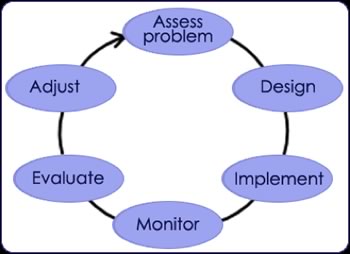Monitoring Design: Adaptive Management
Adaptive management is the process of testing our management hypotheses, measuring the response of the ecosystem, and altering our management based on the new knowledge. Adaptive management is a process to assist individual restoration projects in achieving their objectives (Zedler and Callaway 2003). Our management and stewardship actions at restoration sites are based on hypotheses, whether explicit or implicit, that those actions will lead to achieving our long term ecological goal of restoring a functional estuarine ecosystem that is resilient to ongoing threats and adaptable to climate change.
Monitoring information will be used to assess whether program objectives are being met and whether hypotheses are supported. If program objectives are not being met, monitoring data are important in determining what adaptive management measures need to be taken. Baseline data and intensive monitoring post-restoration will ensure that estuarine responses are recorded and problem areas are attended. Data will be analyzed to identify uncertainties in restoration progress and to determine if project goals are being met.
Some examples of events triggering Adaptive Management Actions could include:
- Colonization of invasive species in the project site or the spread of an established invasive species such as Spartina post-restoration
- Sediment accretion or freshwater marsh vegetation (e.g. cattail, tulle) impeding full tidal inundation and evacuation
- Formation of new distributary channels threatening neighboring properties
- Levee armoring and structural integrity
- Functionality and placement of tide gate or water control structure
References
Zedler, J. B., and J.C. Callaway. 2003. Adaptive restoration: A strategic approach for integrating research into restoration projects. Pp. 167-174 in D. J. Rapport, W. L. Lasley, D. E. Rolston, N. O. Nielsen, C. O. Qualset, and A. B. Damania, eds. Managing for Healthy Ecosystems. Lewis Publishers, Boca Raton, Florida.

